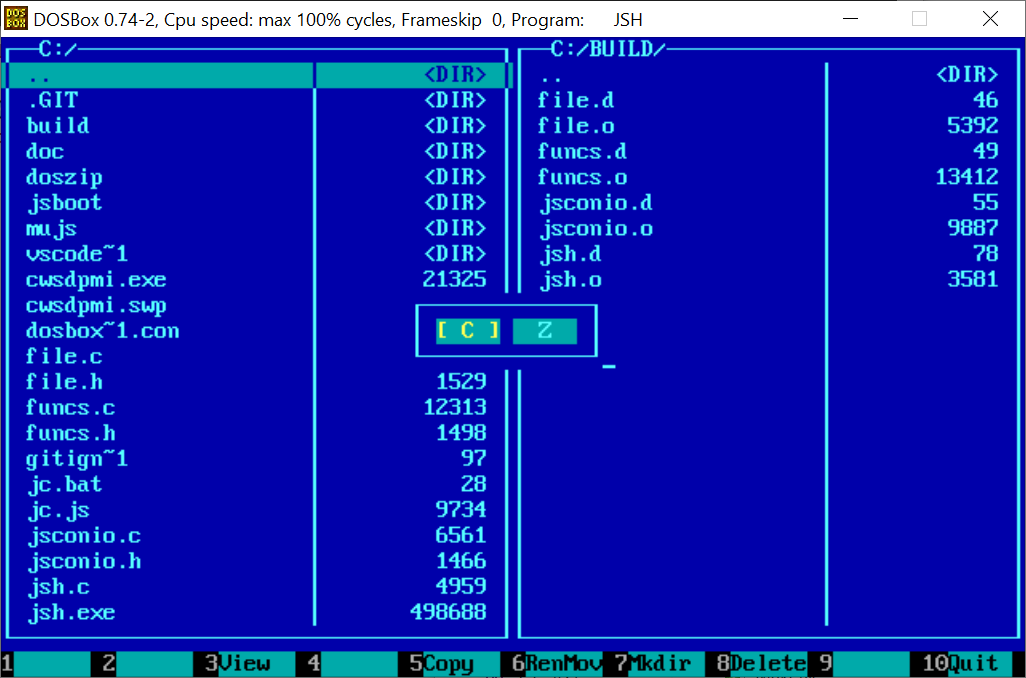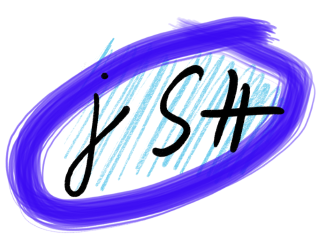jSH is a script interpreter for DOS based operating systems like MS-DOS, FreeDOS or any DOS based Windows (like 95, 98, ME). The focus is on file io and text mode user interfaces.
jSH is a small side project to DOjS, a Javascript coding environment for MS-DOS supporting graphics, sound, etc. including a built in editor and much more
The following script e.g. renames all file extensions in a given directory:
if (args.length < 3) {
Println("Usage:");
Println(" jSH.exe renall.js <dir> <old ext> <new ext>");
Exit(1);
}
var dir = args[0];
var oldExt = args[1].toUpperCase();
var newExt = args[2].toUpperCase();
var files = List(dir);
for (var i = 0; i < files.length; i++) {
var oldName = files[i].toUpperCase();
if (oldName.lastIndexOf(oldExt) != -1) {
var baseName = oldName.substring(0, oldName.lastIndexOf(oldExt));
var newName = baseName + newExt;
Println(dir + "\\" + oldName + " => " + dir + "\\" + newName);
Rename(dir + "\\" + oldName, dir + "\\" + newName);
}
}
Println("All done...");And can be run like this: JSH.EXE RENALL.JS SOMEDIR .FOO .BAR to rename all files ending in .FOO to .BAR.
jSH was only possible due to the work of these people/projects:
- MuJS JavaScript interpreter
- DJGPP from DJ Delorie and the Linux compile scripts by Andrew Wu.
You can find me on Twitter if you want...
You can find binary releases on the GitHub release page. Just extract the contents of the archive and run jSH.
jSH runs in Dosbox and on real hardware or a virtual machine with MS-DOS, FreeDOS or any DOS based Windows like Windows 95/98/ME.
If you run it on real hardware you need at least a 80386 with 4MB. I recommend a Pentium class machine with at least 8MB RAM.
The API is documented in the doc/html/ directory.
For now jSH comes only with a single bigger example: JsCommander. A minimal file manager in the style of the well known Norton Commander.

jSH has a very simple integrated package manager (JPM). It can be started with JPM.BAT.
A working packet driver is needed to connect to the package index and download packages using HTTPS.
Packages (and the package index) are fetched from the DOjS/jSH package repository.
Downloaded packages are put into JSBOOT.ZIP in the PACKAGE/ directory.
Feel free to submit any packages you want to include in that repository using a pull request.
DPM commands:
- installed - list installed packages.
- remove - remove package.
- fetch - fetch package index from server.
- install - install a package (and its dependencies) from package index.
- list - list available packages in index.
- setindex - set index URL (HTTP or HTTPS).
- help - this help.;
- quit - exit dpm.
You can compile jSH on any modern Linux (the instructions below are for Debian based distributions) or on Windows 10 using Windows Subsystem for Linux (WSL). Setup Windows Subsystem for Linux (WSL) according to this guide (I used Ubuntu 18.04 LTS).
Build and install DJGPP 7.2.0 according to this guide. I used the following command lines to update/install my dependencies:
sudo apt-get update
sudo apt-get dist-upgrade
sudo apt-get install bison flex curl gcc g++ make texinfo zlib1g-dev g++ unzip htop screen git bash-completion build-essential npm python-yaml zip dos2unix python3
sudo npm install -g jsdoc
sudo npm install -g better-docsAnd the following commands to build and install DJGPP to /home/ilu/djgpp.:
git clone https://github.com/andrewwutw/build-djgpp.git
cd build-djgpp
export DJGPP_PREFIX=/home/ilu/djgpp
./build-djgpp.sh 7.2.0Make sure dxe3gen and dxe3res are installed as well and set DJPATH permanently to your installation directory of DJGPP.
Open a shell/command line in the directory where you want the source to reside.
Checkout jSH from Github:
git clone https://github.com/SuperIlu/jSH.gitOpen the Makefile in a text editor and change the path to DJGPP according to your installation.
Now you are ready to compile jSH with make clean all. This might take some time as the dependencies are quite a large.
make distclean will clean dependencies as well. make zip will create the distribution ZIP and make doc will re-create the HTML help.
Have a look at the example libraries in test.dxelib/ and test2.dxelib/. Some rules:
- A library called
foomust have the filenamefoo.dxeand must provide at least the functionvoid init_foo(js_State *J). This function is called when the library is loaded and can then register global variables/objects/classes/function in the Javascript runtime. - The library may also provide the function
void shutdown_foo(void)(this is completely optional). This will get called during shutdown and can perform cleanup. - All libraries in the sourcetree will be build by the
make alltarget if their dir-name ends with.dxelib. The Makefile in the directory must provide the targets all, clean and distclean (see examples). - Libraries should use the
Makefile.dxemkwhenever possible. - In theory it should be possible to compile additional native libraries without re-compiling
jSH.EXEif the same compiler is used (see above). - Native libraries may use all functions from
mujs.hand all functions indxetemplate.txt. If additional functions are needed these need to be included in the template andjSH.EXEmust be recompiled! - When libraries are compiled the exports provided by jSH are checked against the used functions (see
check_exports.py) and the build fails if there are symbols missing. - Feel free to provide your native libraries and/or changes to
dxetemplate.txtfor inclusion in the jSH GitHub repository (MIT license please)...
See the changelog for the projects history.
All code from me is released under MIT license.
MuJS is released under ISC license. See COPYING in the MuJS folder for details.
DZComm serial library is release as gift-ware. See readme.txt in the dzcomm folder for details.
CWSDPMI DPMI host is licensed under GPL. The documentation states:
The files in this binary distribution may be redistributed under the GPL (with source) or without the source code provided.
zip is licensed by UNLICENSE
WATTCP - TCP/IP library routines
Copyright (c) 1990, 1991, 1992, 1993 Erick Engelke
Portions Copyright (c) 1993 Quentin Smart Portions Copyright (c) 1991 University of Waterloo Portions Copyright (c) 1990 National Center for Supercomputer Applications Portions Copyright (c) 1990 Clarkson University Portions Copyright (c) 1983, 1986, Imagen Corporation
This software is distributed in the hope that it will be useful,
but without any warranty; without even the implied warranty of
merchantability or fitness for a particular purpose.
RESTRICTIONS You may freely use this library to produce programs which you may give away or sell in source format, or as compiled executables, or both.
You may not sell this library or a portion thereof or distribute modified versions the library code in either source or OBJect or LIBrary format without written permission from the author. The author still maintains copyright privileges and will assert the privileges of ownership for purposes of royalties such distributions.
Portions of this code were written or enhanced by others and offerred to me for distribution in WATTCP under my copyright. To my knowledge, all copyrights exercised are listed at the top of this file. If this is incorrect, please contact me so I can rectify the situation.
PCTIMER is Freeware
